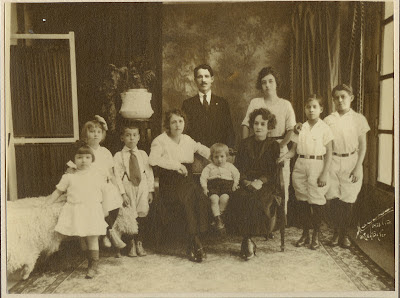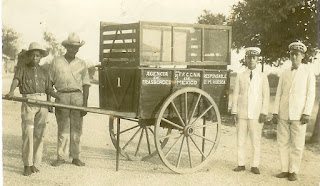Gilbert Cayetano Huesca
(1915 – 2009)
For as long as I can remember, nearly all the stories my father, Gilbert Huesca, told of his life as a young boy included his parents. During this early period, his father, Jose Gil Alberto Cayetano Huesca, was a major influence on his life. He credited my grandfather’s vision and wisdom with forming his values and his own style of parenting, and he never spoke of him without a deep tone of reverence. The recollections that follow are told in my father’s own words, taken from our many conversations over the years.
– Linda Huesca Tully
“My father was a very wise and industrious man. We were 11 children in all, and he did his best to provide for us and give us a home and a good life. He needed to provide beds for all of us, so he bought a hotel.
“All of us worked in that hotel, from oldest to the youngest, whether it was washing windows or mopping floors. And the youngest ones had to help, too, even if it was to carry something for my mother. I had to make all the beds every morning before I went to school. Not half-way, but the right way: with perfect corners, no wrinkles, and the sheets tucked in neatly and evenly. My sister Catrín (Catalina) used to wash the dishes. There were a lot of dishes.
“My brothers, Enrique and Eduardo, helped with many things, but one of those was meeting the hotel guests at the train station and delivering their luggage to the hotel. My father used to emphasize to us, ‘We are a team,’ and we did work as a team, every single one of us.
“He wanted us to be good athletes, so he built a roller skate rink and a bowling alley. All the people in the town used to go there. I think the bowling alley was the first one in the town, and my father built it himself, with my brothers and I there, helping him. It is not easy to build a bowling alley, because you have to keep the lanes very level and observe standard regulations.
“Everything has to be planned right the first time, and everything has to done precisely. My father was particular with every detail. We could not rush the job, and he involved us in all the steps. So we learned more than just how to bowl. We learned how to be patient and how to plan our work and how to do things right.
“I suppose that because I was very young, I took things literally. In 1921, when I was five or six years old, a general came to the hotel to rent a room. He was a great big man, and he had a very impressive uniform with shiny buttons and a lot of medals. But I could tell there was something about him that my father did not like. My father needed to leave the room for a few minutes, and I guess he was concerned that the general might take the money from the cash register.
“There was no one else there with us, so he turned to me and discreetly pointed his finger below his eye – ‘ojo.’ When he returned, there I was, with my eyes open very wide, and my index finger pressed against my lower eyelid as I watched the general – all business!
“Another time a lady came to visit at the hotel. She was a large lady. My father told me to bring her a chair. Well, I was still very young at that time. I brought her two chairs and pushed them together for her. I thought I was being helpful, so my father’s reaction surprised me. He was so embarrassed!
“He just looked at me, speechless. What could he say? The lady stared in shock at the two chairs for a few moments and finally sat down. Then she began to laugh. ‘From the mouths of babes!’ she said.”
Copyright © 2012 Linda Huesca Tully

,+Oirzaba,+Veracruz.jpg)